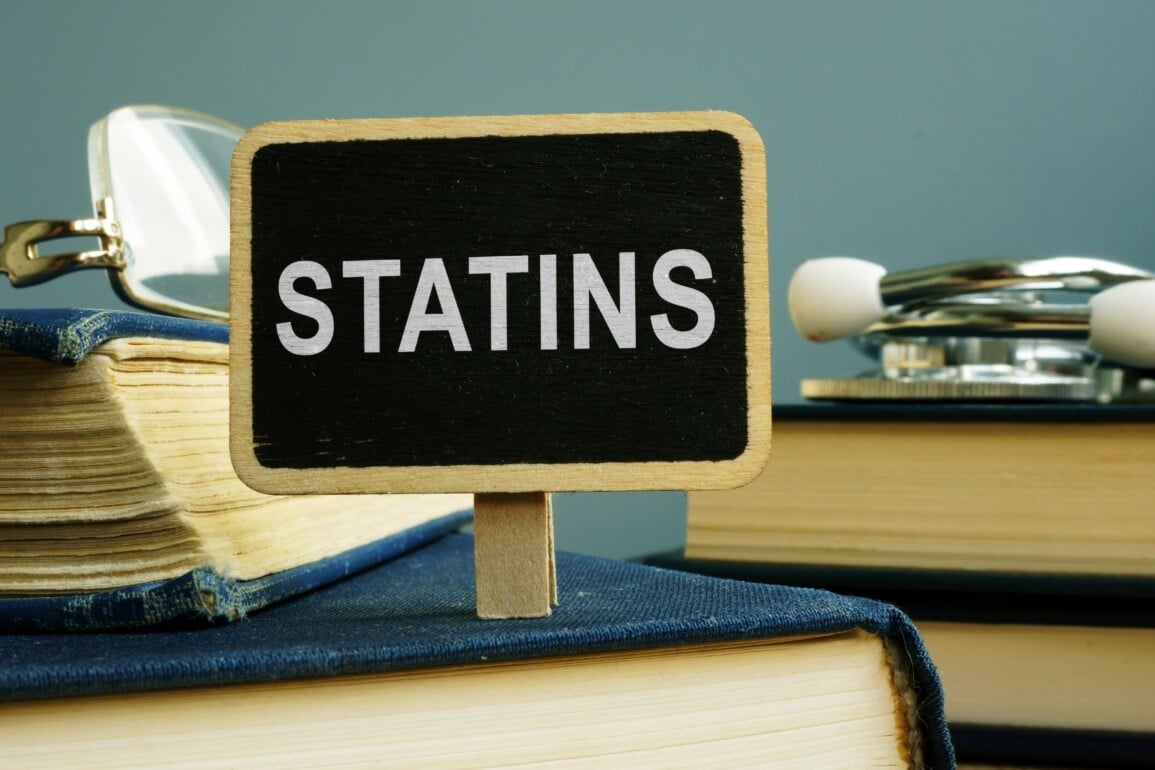Does Lipitor cause insomnia? It’s a common question for anyone concerned about the side effects of statins, and their impact on sleeping habits. Unfortunately, there are a number of medications which can end up causing problems with your sleep quality. It seems atorvastatin sleep disturbance is a real issue.
Lipitor, otherwise known as Atorvastatin, is one of the most common kinds of medications used for the management of high cholesterol. Taken according to the direction of your doctor, Lipitor can be an important tool in reducing your risk of stroke, heart attack, and blood clots altogether.
While Lipitor has its values as a powerful treatment for reducing cholesterol, the side effects associated with this substance can be too much for some people to handle.
Here’s everything you need to know about Lipitor, and how it influences your sleep.
Do Statins cause insomnia? What is Lipitor
Lipitor, also sold under the generic name “Atorvastatin” is just one of the many medications you may use on a daily basis, which could end up having a negative impact on your sleep.
Lipitor is a prescription drug called a statin, responsible for reducing the LDL cholesterol in the blood stream. LDL is often referred to as the “bad cholesterol” in your blood.
High levels of “bad cholesterol” in your body can have a serious impact on your health, increasing your risk of everything from stroke to heart attacks and other blood vessel problems.
Statins like Lipitor work by blocking a liver enzyme called HMG-CoA, which is required for the production of Low-Density Lipoproteins (bad cholesterol).
By minimizing the amount of LDL in the blood, Lipitor can help to prevent atherosclerosis, in which plaque deposits form throughout the inner walls of the arteries, causing them to narrow or stiffen. This also reduces your risk of various complications atherosclerosis may give you.
Lipitor can even increase your levels of high-density lipoproteins (otherwise known as good cholesterol) which can help to protect you against heart attacks.

What are the most common side effects of Lipitor?
Regarded the most potent and popular member of the statin family of drugs (the most widely prescribed class of medications in the US), Lipitor is extremely common medication.
This substance is widely considered to be safe for most users, but like any medication, it can have its side effects. Most of the common side effects of Lipitor are minimal, such as nausea or the occasional stomach pain. Some common side effects include:
- More regular UTIs
- Cold-like symptoms
- Joint pain
- Stomach pain
- Nausea
- Muscle pain
- Difficulty falling and staying asleep
In some clinical trials, some patients have also reported other side effects like blurred vision, nose bleeds, and ringing in the ears. Others reported fever, abnormal blood test results, and a general sense of uneasiness and discomfort.
How does Lipitor cause insomnia?
Everyone who takes Lipitor won’t necessarily have issues with sleep disturbances. However, there are a number of reasons why these medications may cause insomnia. First, if you experience any of the side effects mentioned above, you’re more likely to have trouble sleeping.
Stomach pain, joint pain, and cold-like symptoms can all make it difficult to fall asleep and stay asleep. Additionally, studies into the side effects of Lipitor and similar fat-soluble statins show they are more likely to cause insomnia, nightmares, and other sleep problems.
Though further research is necessary to determine exactly why certain statins are more likely to cause insomnia than others, experts predict it has something to do with the ability of fat-soluble statins to penetrate cell membranes and bypass the blood-brain barrier. The blood-brain barrier is responsible for protecting the brain against chemicals in the blood.
For patients asking, “which stain does not cause insomnia?” the answer may be a statin which is water, rather than fat soluble.
A large number of studies into the potential results of taking statins long-term seem to suggest sleep disturbances are a common complaint of many patients. Patients have also reported issues like cognitive impairment and muscle pain, which further disrupt sleep.
Do all statins cause insomnia?
It’s difficult to determine whether any medication will definitely cause a certain kind of side effect. Statins aren’t always associated with insomnia. The most common side-effect of most statins is muscle pain – which is a more indirect issue responsible for keeping people awake. Some patients have even described the muscle pain caused by statins to be immobilizing.
Studies have also indicated statins may be responsible for interfering with muscle growth, by inhibiting the management of satellite cells in the muscle. Muscle aches and weaknesses throughout the body may be a symptom of a statin-induced case of rhabdomyolysis – a breakdown of skeletal muscles wherein muscle fibers are released into the bloodstream.
These side effects apply to all statins. However, there may be a higher risk of insomnia from fat soluble statins, due to their ability to penetrate the blood-brain barrier. Because of this, patients who complain about insomnia when taking Lipitor, may be advised to switch to a water-soluble statin.
Additionally, it’s worth noting the side effects associated with statins have begun to prompt some doctors to recommend other, more natural ways of reducing cholesterol. If you have an issue with your cholesterol levels, your doctor might advise making changes to your diet and exercise routine before considering statins.

How can you avoid an Atorvastatin sleep disturbance?
If you’re worried about the impact of Lipitor or a similar statins on your sleeping schedule, the best thing you can do is speak to your doctor. Your healthcare provider may be able to suggest an alternative medication with a lower risk of common side effects like insomnia.
Alternatively, you can ask your doctor questions like “When is the best time to take Lipitor?” As Lipitor has a long half-life, the level of statin in your blood should be stable all day and night. In spite of this, you might feel some changes to your sleep, if you take the tablet just before bed.
To determine whether using the medication earlier in the day may have less of an impact on your sleep, some doctors will recommend taking Lipitor in the morning instead of at night.
When attempting to reduce the risk of side effects of Lipitor, most doctors will recommend starting with the lowest dose of 10 mg. Lower doses of medications are often associated with a lower risk of side effects. Your doctor could also suggest:
Natural alternatives
If your need for statins isn’t deemed great enough by your doctor to risk the side effects, they may suggest a natural alternative. For instance, Folic acid, Vitamin B12, and Vitamin B6 can all help you to lower your blood levels of homocysteine, which can commonly be linked to high cholesterol.
Red yeast rice, yeast grown on white rice, have compounds reducing cholesterol levels. You can also look into reducing the cholesterol in your diet, eating healthier foods, and exercising more.
Sleep hygiene methods
Improving your overall sleep hygiene can improve your chances of getting a better night’s sleep, even in a difficult situation. Your doctor can offer advice like following a regular routine before bed or making sure the bedroom you sleep in is dark, cool, and comfortable before you drift off to sleep.
Reduce your exposure to stimulants
If your use of statins is already causing problems with your sleep, the last thing you need is for more issues to get in the way. Reducing your exposure to various stimulants like coffee, energy drinks, and other sources of caffeine can help you to get a better night’s sleep. It’s also a good idea to avoid alcohol, as this can have a stimulating impact on the central nervous system.
Explore alternative statins
If you do need to take a statin to manage your cholesterol levels, there’s a chance Lipitor might not be the right option for you. People suffering from a number of side effects including insomnia may be advised to switch to a different kind of statin and track their responses.
Statins and insomnia
Generally, your doctor is likely to advise taking statins at night, because your body makes the most cholesterol at night. However, this doesn’t mean there aren’t steps you can take to reduce the negative impact statins can have on your sleep.
If taking statins is crucial to your health, which in many cases they are, you should be prepared to try out different types of statins. You might have to experiment with taking them at different times a day. If you suffer from severe muscle pain from statin use, it could help with a Q10 supplement. Remember, just taking one statin tablet a week is considered better than none at all.
If you’re considering taking Lipitor, your doctor will discuss the potential side effects with you in advance and give you some guidance on the steps you can take to reduce your risks. You may even be able to avoid taking this medication entirely for a while, by changing your lifestyle and upgrading your eating habits.
If you do need to take Lipitor and you find yourself asking the question: “Does Lipitor cause insomnia“? Do speak to your doctor as early as possible about what you can do.
Siestio. Sleep Matters.
Medical disclaimer
You must not rely on the information provided on our website as an alternative to medical advice from your doctor or other healthcare professionals. For more information read our full disclaimer here.







